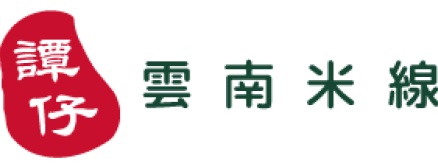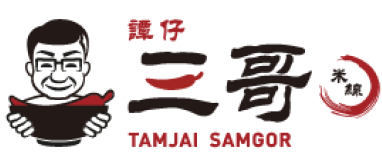The Toridoll Group has established a management organizational structure and mechanisms based on the policy of accelerating decision-making to demonstrate agility, accelerating business expansion, and maintaining soundness and transparency.
In addition, we have established an Audit and Supervisory Committee as an audit and supervisory body for management, and each committee member attends the board of directors' meetings and, when making management decisions, speaks up, gives necessary advice, and exercises voting rights from the perspective of ensuring the soundness of management. At the Audit and Supervisory Committee meetings, which are held at the same time, committee members share information and strive to disclose information promptly, aiming for highly transparent management.
Policy and Management System
Corporate Governance Systems
Toridoll Holdings is strengthening its governance system to improve its corporate value over the medium to long term. The Board of Directors consists of eight members (as of July 2024), including four internal directors and four external directors, and has established a system that allows for agile decision-making while maintaining soundness and transparency. In addition, to properly supervise business execution, four independent external directors (two of whom are women) have been appointed, and three of these independent external directors who are certified public accountants or lawyers have been appointed as audit and supervisory committee members, strengthening the audit system.
Management System
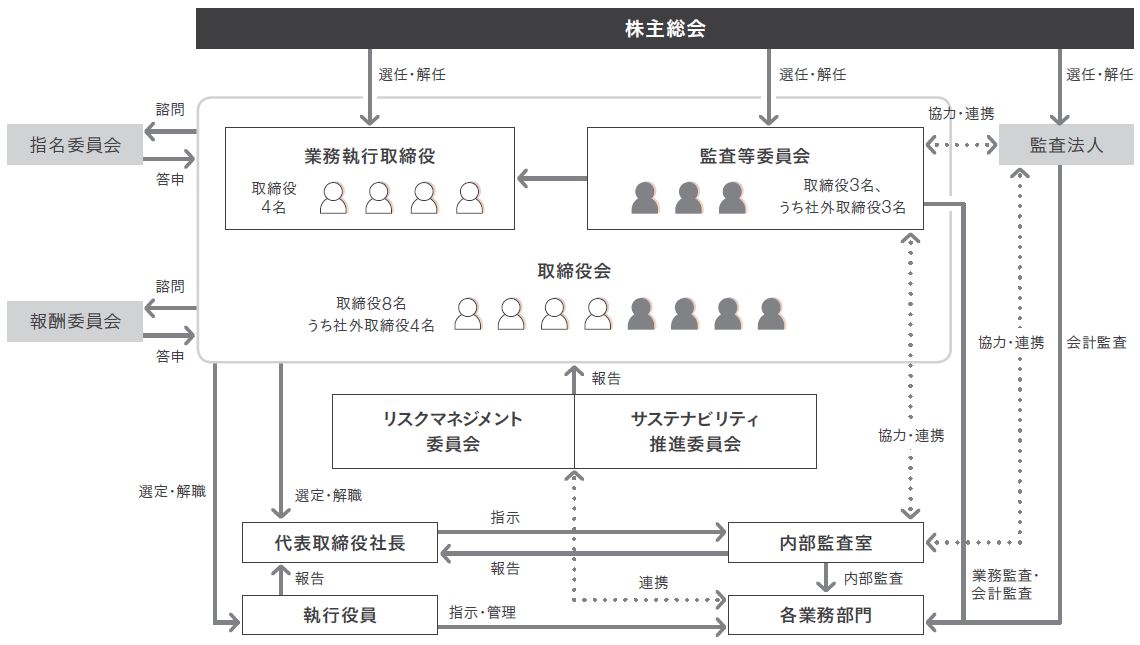
Roles of the Board of Directors and other major meetings, and status of holding and attending
The roles of the Board of Directors and major meetings, and the status of meetings in the fiscal year ending March 31, 2024, are as follows:
role | Number of events | |
board of directors | This is a meeting body composed of directors who have been entrusted with managing the company by shareholders, and makes decisions regarding important matters concerning the company in accordance with laws, regulations, the articles of incorporation, etc. | 18 |
Audit and Supervisory Committee | This is a meeting body composed of audit and supervisory committee members who have been entrusted by shareholders with the task of auditing and supervising company management, and it audits and supervises the performance of duties by directors. | 14 |
Nomination Committee | This committee, which is primarily composed of outside directors, deliberates on the appointment and dismissal of directors (including audit and supervisory committee members) and executive committee members, and reports its findings to the Board of Directors and the Audit and Supervisory Committee. | 3 |
Compensation Committee | This committee, which is primarily composed of outside directors, deliberates on remuneration for directors (including audit and supervisory committee members) and executive officers and reports to the Board of Directors and the Audit and Supervisory Committee. | 4 |
Risk Management Committee | This committee, established under the Board of Directors, discusses and approves issues and countermeasures related to the promotion of company-wide risk management. | 4 |
Sustainability Promotion Committee | This committee, established under the Board of Directors, discusses and approves issues and countermeasures related to the promotion of sustainability across the company. | 4 |
Attendance at Board of Directors and Audit and Supervisory Committee Meetings (Fiscal year ending March 2024)
Title | Name | Board of Directors | Audits, etc. Committee | name Committee | Rewards Committee | Risk Management Committee | Sustainability Promotion Committee |
President and CEO CEO | Takaya Awata | ◎ (18/18) | ● (3 times/3 times) | ● (4 times/4 times) | ◎ (4 times/4 times) | ◎ (4 times/4 times) | |
|---|---|---|---|---|---|---|---|
Executive Vice President and COO | Takashi Sugiyama | ● (18/18) | ● (4 times/4 times) | ● (4 times/4 times) | |||
Director and CSCO | Masatoshi Kamihara | ● (18/18) | ● (4 times/4 times) | ● (4 times/4 times) | |||
Director and CFO | Satoshi Yamaguchi | ● (11 times/11 times) | ● (4 times/4 times) | ● (4 times/4 times) | |||
Outside Director | Rieko Matsukaze | ● (10/11 times) | ● (3 times/3 times) | ● (4 times/4 times) | ● (4 times/4 times) | ● (4 times/4 times) | |
Outside Director (Audit and Supervisory Committee Members) | Toshiyasu Umeki | ● (18/18) | ◎ (14 times/14 times) | ◎ (3 times/3 times) | ◎ (4 times/4 times) | ● (4 times/4 times) | ● (4 times/4 times) |
Outside Director (Audit and Supervisory Committee Members) | Hiroaki Umeda | ● (18/18) | ● (14 times/14 times) | ● (3 times/3 times) | ● (4 times/4 times) | ● (4 times/4 times) | ● (4 times/4 times) |
Outside Director (Audit and Supervisory Committee Members) | Maki Kataoka | ● (18/18) | ● (14 times/14 times) | ● (3 times/3 times) | ● (4 times/4 times) | ● (4 times/4 times) | ● (4 times/4 times) |
※◎: Chairperson or committee member
*The attendance figures for Yamaguchi Satoshi and Matsukaze Rieko only cover board meetings held after their appointment on June 29, 2023.
Assessment of the Effectiveness of the Board of Directors
At the beginning of 2024, we invited an external advisor and began preparations for this year's evaluation of the effectiveness of the Board of Directors through the advisor's attendance at the Board of Directors meetings and various committees. Through these activities, we are striving for continuous improvement while taking into account advice from an objective third-party perspective on initiatives to enhance the effectiveness of the Board of Directors. However, as issues remain in the following areas, we will continue to make efforts to make further improvements in the future.
- The board of directors should be fully aware of its role of leading the effort to increase corporate value and should focus on discussing management strategies, business strategies, and other issues that will contribute to increasing corporate value.
・Investment effectiveness should be examined more than ever before, with an eye on capital efficiency, etc.
Internal Control Systems
TORIDOLL Holdings has formulated clear fundamental policies that the President and CEO must comply with, enacted various provisions necessary for the establishment of internal control systems, and positioned them for implementation as quickly as possible under the guidance of the person-in-charge. We continually review and improve internal control systems and seek to create efficient and lawful corporate structures.
Internal Audit Systems
Toridoll Holdings has established the "Internal Audit Regulations" and established an Internal Audit Office as an organization reporting directly to the President and CEO. The Internal Audit Office formulates audit policies and annual plans, audits the status of business execution based on the prescribed rules for each department at the head office and group companies, evaluates the status of internal control and its operation, and proposes improvements. The results of the audits are reported to the President and CEO and the Audit and Supervisory Committee (outside directors).
Accounting Audits
Toridoll Holdings has signed an audit contract with KPMG AZSA LLC, and has established an environment in which accounting audits can be conducted from an independent and fair standpoint. In addition, Toridoll Holdings' Audit and Supervisory Committee and Internal Audit Department cooperate with KPMG AZSA LLC through reporting meetings held at least four times a year to conduct audits.
Strategic Shareholdings
TORIDOLL Group does not hold listed shares as strategic shareholdings. The Group policy is to not engage in such holdings in order to avoid the risks of fluctuations in share prices and to enhance capital efficiency.
Election of Directors and Officer Compensation
Appointment of Directors
Toridoll Holdings has established a voluntary nomination committee of which all independent outside directors make up a majority of the members, and it is its policy to receive recommendations from the nomination committee when nominating candidates for directors (including directors who are audit and supervisory committee members).
The Nomination Committee deliberates whether each candidate meets the selection criteria established by the Board of Directors, and then decides on the content of its recommendations to ensure that the board of directors is composed of a good balance of the knowledge, experience, and abilities required to effectively fulfill the roles and responsibilities of a director, and that the board is composed of both diversity and an appropriate size.
Skills Matrix for the Board of Directors and Executive Officers
For executive directors, we have appointed experienced individuals with extensive knowledge of the restaurant industry, food distribution, and overseas business. Furthermore, among the independent outside directors, those who are audit and supervisory committee members are appointed from among individuals with knowledge of internal control, appropriate legal knowledge, and appropriate finance and accounting knowledge. For outside directors who are not audit and supervisory committee members, we have appointed individuals with management experience at other companies, with an awareness of the diversity of knowledge and experience that will enable them to fulfill their responsibilities as independent outside directors. In addition, with consideration given to gender diversity, two female directors have been appointed. The particular expertise and experience of directors and executive officers is as shown in the table below.
Position in our company | Business Management | global | Accounting and Finance | Capital Policy M&A | Legal Compliance | ESG | Food and beverage business | marketing Store Development | product quality management | DX Innovation | Digital Technology ICT | Personnel, Labor and Human Resources Development | |
|---|---|---|---|---|---|---|---|---|---|---|---|---|---|
Takaya Awata | President and CEO | ● | ● | ● | ● | ● | |||||||
Takashi Sugiyama | Executive vice-president | ● | ● | ● | ● | ● | ● | ● | ● | ● | |||
Satoshi Yamaguchi | Director | ● | ● | ● | ● | ● | |||||||
Kenichi Tanaka | Director | ● | ● | ● | ● | ● | ● | ||||||
Rieko Matsukaze | Outside Director | ● | ● | ● | ● | ● | ● | ● | |||||
Toshiyasu Umeki | Outside Director (Audit and Supervisory Committee Member) | ● | ● | ● | |||||||||
Hiroaki Umeda | Outside Director (Audit and Supervisory Committee Member) | ● | ● | ● | |||||||||
Maki Kataoka | Outside Director (Audit and Supervisory Committee Member) | ● | ● | ● |
Independent External Directors
In order to strengthen its corporate governance structure, Toridoll Holdings has transitioned to a company with an audit and supervisory committee and has appointed four independent outside directors who are fully qualified in light of the expected roles and responsibilities.
In addition, in order to ensure that opinions independent of management are appropriately reflected when making decisions on various investments aimed at future business expansion, four of the eight directors have been appointed as independent outside directors.
Reasons for selection | |
Toshiyasu Umeki | In addition to being able to obtain accurate opinions based on his specialized knowledge as a certified public accountant, he is also familiar with our company's internal operations having previously served as an advisor to the company, and we have therefore determined that he is a suitable candidate and appointed him as an outside director. We have determined that he has no conflict of interest with the Company, is able to oversee the Company from an independent standpoint, and is not likely to pose a conflict of interest with general shareholders, and therefore designated him as an independent director. |
Hiroaki Umeda | In addition to being able to obtain accurate opinions based on his specialized knowledge as a certified public accountant, he was previously an advisor to the Company and is therefore well-versed in internal operations. We have therefore determined that he is well-qualified and appointed him as an outside director. We have determined that he has no conflict of interest with the Company, is able to oversee the Company from an independent standpoint, and is not likely to pose a conflict of interest with general shareholders, and therefore designated him as an independent director. |
Maki Kataoka | He has been appointed as an Outside Director based on the judgment that he is well-qualified for the position, as he can provide accurate opinions based on his specialized knowledge as an attorney. We have determined that he has no conflict of interest with our company, is able to oversee the company from an independent standpoint, and is not likely to pose a conflict of interest with general shareholders, and therefore have designated him as an independent director. |
Rieko Matsukaze | He has extensive experience, a proven track record and knowledge in global business management, marketing, and accounting/finance. He is able to provide appropriate recommendations and advice on the Company's management from an objective, expert perspective. As such, he has been deemed qualified and appointed as an outside director. We have determined that he has no conflict of interest with the Company, is able to oversee the Company from an independent standpoint, and is not liable to have a conflict of interest with general shareholders, and therefore designated him as an independent director. |
Policy on Determination of Officer Compensation
On May 31, 2017, we established the Executive Compensation Regulations, increasing the proportion of compensation linked to medium- to long-term performance and the proportion of company stock compensation, thereby providing directors (excluding Audit and Supervisory Committee members) with an incentive to work toward sustainably improving the corporate value of the Group and introducing a compensation system that will quickly encourage directors to share that value with shareholders.
(a) Basic principles of the executive compensation system
Remuneration for directors (excluding Audit and Supervisory Committee members) consists of basic remuneration, short-term incentive remuneration (performance-linked bonuses), and long-term incentive remuneration (restricted stock and stock options).
Remuneration for directors (Audit and Supervisory Committee members) consists of basic remuneration and long-term incentive remuneration (stock options).
(b) Remuneration determination procedures
When determining the remuneration of Directors (excluding Audit and Supervisory Committee members), the Company ensures objectivity in the level of remuneration for Directors (excluding Audit and Supervisory Committee members) by obtaining advice from an external specialist institution based on executive remuneration survey data (including the percentage of each type of remuneration).
In addition, since the establishment of the Compensation Committee in December 2020, the compensation (including the ratio of each type of compensation) of directors (excluding audit and supervisory committee members) has been determined through the recommendation of the Compensation Committee, which is made up of all independent outside directors and comprises a majority of the independent outside directors. Even before the establishment of the Compensation Committee, when deciding to exercise its right to express opinions (Article 361, Paragraph 6 of the Companies Act), the Audit and Supervisory Committee deliberated whether the compensation of directors (excluding audit and supervisory committee members) was appropriate in light of the company's performance and the performance of their duties.
(c) Overview of short-term incentive compensation (performance-linked bonus)
The total amount of performance-linked bonuses will be capped at the total amount to be paid for the relevant fiscal year set in advance by the Board of Directors and will be determined according to the achievement of the budget targets set in advance by the Board of Directors based on the Group's consolidated revenue and consolidated profit for the year attributable to owners of the parent company for the relevant fiscal year.
The Company uses consolidated revenue and profit attributable to owners of the parent as indicators of short-term incentive compensation (performance-linked bonuses) because these figures are publicly available and serve as clear measures of corporate size and profitability.
In addition, each Director (excluding Audit and Supervisory Committee Members) shall be paid the above total performance-linked bonus in an amount calculated by dividing the total amount by the position-specific coefficient determined in advance by the Board of Directors for each position.
Total amount of remuneration for directors and audit and supervisory committee members (FY2023)
Officer Category | Total amount of remuneration (million yen) | Total amount by type of remuneration (million yen) | Number of applicable executives (persons) | ||
|---|---|---|---|---|---|
Base compensation | Performance-linked remuneration | Non-monetary remuneration, etc. | |||
Directors (exc. Audit and Supervisory Committee members) (including outside directors) | 170 (9) | 140 (9) | 15 (ー) | 16 (ー) | 5 (1) |
Director (Audit and Supervisory Committee Member) (including outside directors) | 23 (23) | 21 (21) | ー (ー) | 2 (2) | 3 (3) |
Total (including outside directors) | 194 (32) | 161 (30) | 15 (ー) | 18 (2) | 8 (4) |
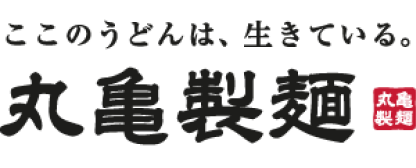



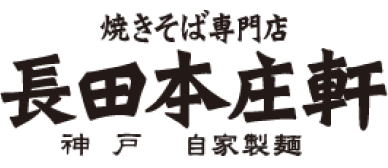

.png)


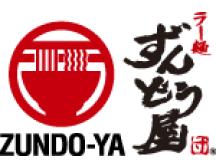

.png)


